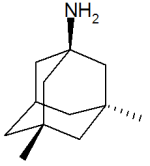Synopsis: Memantine (Namenda) is an N-methyl-d-aspartate (NMDA) receptor blocker indicated for the treatment of moderate to severe Alzheimer's disease (AD). The NMDA receptor is activated by glutamate, the primary excitatory neurotransmitter in the brain. Overstimulation by glutamate may result in neuronal damage and has been implicated in neurodegenerative disorders such as AD. Memantine is the first pharmacologic agent approved by the U.S. Food and Drug Administration for the treatment of moderate to severe AD.
Safety: No serious adverse events have been identified in clinical trials. (1,2) Additionally, memantine has been available in Germany since 1982 with no reports of serious adverse events. (3) Memantine is category B in pregnancy, (1) but it is unlikely to be used in this young patient population. The major route of elimination for memantine is renal; therefore, the use of this drug in patients with severe renal impairment is not recommended. Dose reduction should be considered if moderate renal impairment occurs. (1)
Tolerability: Memantine seems to be well tolerated. In clinical trials, dropout rates were similar in the treatment and placebo groups. (1,2) In a study of 252 patients, 17 percent of memantine-treated patients and 10 percent of placebo-treated patients discontinued treatment because of adverse events during 28 weeks of treatment. (4) The most commonly reported side effects, occurring with equal frequency with memantine and placebo, include agitation, urinary incontinence, urinary tract infections, insomnia, and diarrhea. Side effects occurring at a higher rate in patients taking memantine than in patients taking placebo include dizziness (7 percent), headache (6 percent), constipation (6 percent), and confusion (6 percent). (1)
Effectiveness: Memantine produces small effects in patients with moderate to severe dementia, although most research to date has been short-term (six months or less) and with relatively few patients. (2) As demonstrated in one large study (4) comparing memantine with placebo, patients with significant impairment (mean Mini-Mental State Examination score of 8 out of 30) receiving memantine have a slight but statistically significant improvement in scores on scales measuring overall global change, functional capacity, progressive functional deterioration, and cognitive performance. However, the clinical significance of these improvements is small, in the range of a 5 percent absolute increase on these scales. (3) Patients receiving memantine may require less caregiver time; in this study, caregiver time was decreased 45.8 hours per month compared with the placebo group. However, the 95 percent confidence interval was wide, 10.4 to 81.3 (P=.01). More global measures, such as the Mini-Mental State Examination score, Global Deterioration Scale stage, and Neuropsychiatric Inventory scores, did not improve.
Memantine might be useful in combination with other treatments for AD, such as the anticholinesterase inhibitor donepezil. (5)
Price: Memantine costs approximately $1,634 per year (no generic available). The cost of other drugs for AD, such as donepezil, is about $1,787 per year (no generic available).
Simplicity: The recommended starting dosage of memantine is 5 mg taken by mouth every day. The dosage should be titrated up by 5 mg every week to a target dosage of 10 mg twice daily. No laboratory monitoring is required.
Bottom line: Memantine is well tolerated, but its clinical benefits for the treatment of moderate to severe AD appear modest. (2,4,6) The reduction in caregiver time requires confirmation in another trial. As with other drugs for AD, memantine does not reverse deterioration.
REFERENCES
(1.) Forest Pharmaceuticals, Inc. Namenda package insert. St. Louis, Mo: October, 2003. Accessed online January 30, 2004, at: http://www.namenda. com/pdf/namenda_pi.pdf.
(2.) Areosa SA, Sherriff F. Memantine for dementia. Cochrane Database Syst Rev. 2003;(4):CD003154.
(3.) Facts: about memantine, an experimental Alzheimer's drug. Alzheimer's Association 2003. Accessed online January 30, 2004, at: http:// www.alz.org/resourcecenter/bytopic/memantine. htm.
(4.) Reisberg B, Doddy R, Stoffler A, Schmitt F, Ferris S, Mobius HJ. Memantine Study Group. Memantine in moderate-to-severe Alzheimer's disease. N Engl J Med 2003;348:1333-41.
(5.) Tariot PN, Farlow MR, Grossberg CT, et al. Memantine treatment in patients with moderate to severe Alzheimer's disease already receiving donepezil. A randomized controlled trial. JAMA 2004;291:317-24.
(6.) Memantine for Alzheimer's disease. Med Lett Drugs Ther. 2003;45:73-4.
Adrienne Z. Ables, Pharm.D., is associate professor at Spartanburg Family Medicine Residency Program, Spartanburg, S.C.
COPYRIGHT 2004 American Academy of Family Physicians
COPYRIGHT 2004 Gale Group



